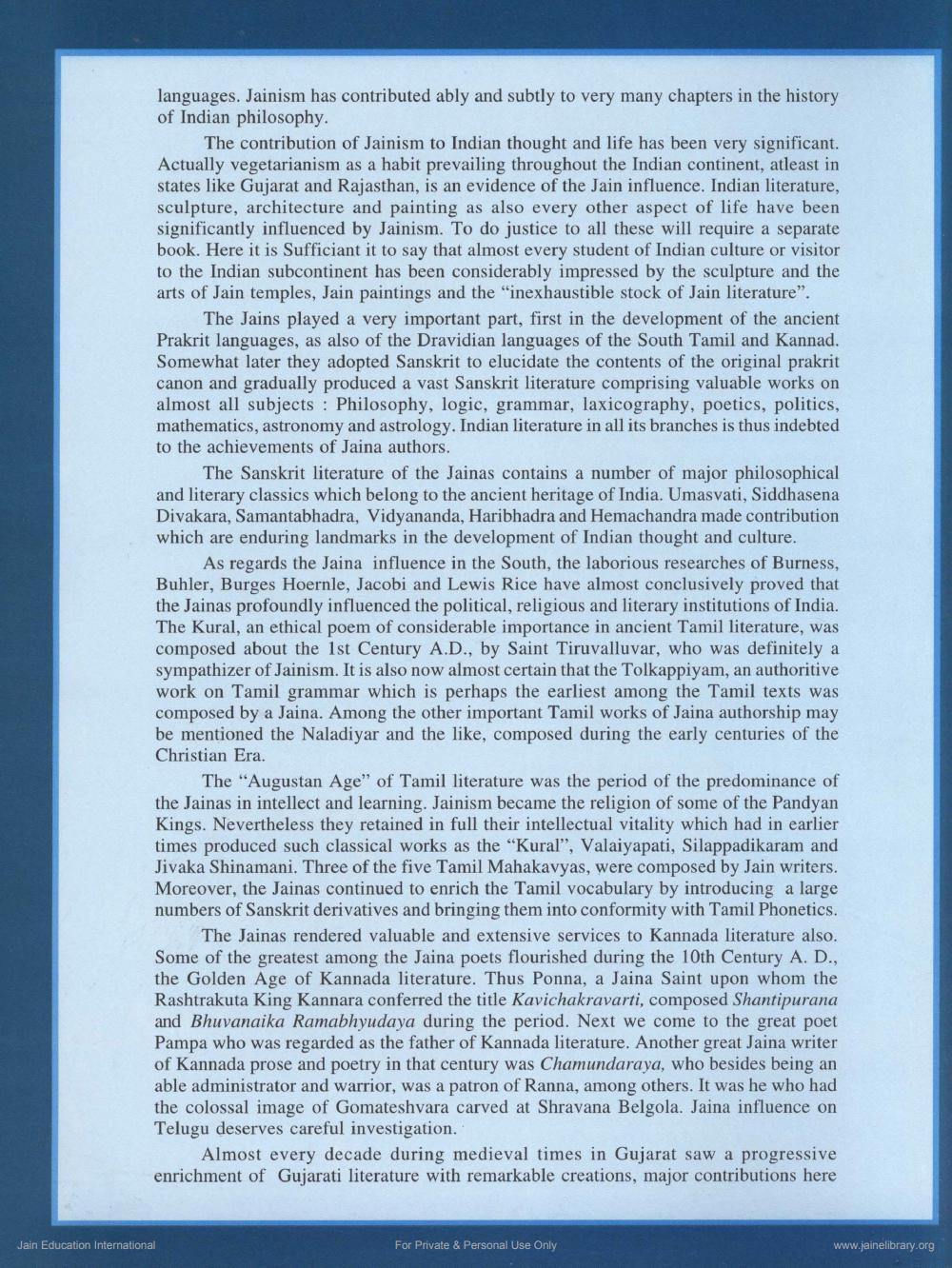________________
languages. Jainism has contributed ably and subtly to very many chapters in the history of Indian philosophy.
The contribution of Jainism to Indian thought and life has been very significant. Actually vegetarianism as a habit prevailing throughout the Indian continent, atleast in states like Gujarat and Rajasthan, is an evidence of the Jain influence, Indian literature, sculpture, architecture and painting as also every other aspect of life have been significantly influenced by Jainism. To do justice to all these will require a separate book. Here it is Sufficiant it to say that almost every student of Indian culture or visitor to the Indian subcontinent has been considerably impressed by the sculpture and the arts of Jain temples, Jain paintings and the "inexhaustible stock of Jain literature".
The Jains played a very important part, first in the development of the ancient Prakrit languages, as also of the Dravidian languages of the South Tamil and Kannad. Somewhat later they adopted Sanskrit to elucidate the contents of the original prakrit canon and gradually produced a vast Sanskrit literature comprising valuable works on almost all subjects : Philosophy, logic, grammar, laxicography, poetics, politics, mathematics, astronomy and astrology. Indian literature in all its branches is thus indebted to the achievements of Jaina authors.
The Sanskrit literature of the Jainas contains a number of major philosophical and literary classics which belong to the ancient heritage of India. Umasvati. Siddhasena Divakara, Samantabhadra, Vidyananda, Haribhadra and Hemachandra made contribution which are enduring landmarks in the development of Indian thought and culture.
As regards the Jaina influence in the South, the laborious researches of Burness, Buhler, Burges Hoernle, Jacobi and Lewis Rice have almost conclusively proved that the Jainas profoundly influenced the political, religious and literary institutions of India. The Kural, an ethical poem of considerable importance in ancient Tamil literature, was composed about the 1st Century A.D., by Saint Tiruvalluvar, who was definitely a sympathizer of Jainism. It is also now almost certain that the Tolkappiyam, an authoritive work on Tamil grammar which is perhaps the earliest among the Tamil texts was composed by a Jaina. Among the other important Tamil works of Jaina authorship may be mentioned the Naladiyar and the like, composed during the early centuries of the Christian Era.
The "Augustan Age" of Tamil literature was the period of the predominance of the Jainas in intellect and learning. Jainism became the religion of some of the Pandyan Kings. Nevertheless they retained in full their intellectual vitality which had in earlier times produced such classical works as the “Kural", Valaiyapati, Silappadikaram and Jivaka Shinamani. Three of the five Tamil Mahakavyas, were composed by Jain writers. Moreover, the Jainas continued to enrich the Tamil vocabulary by introducing a large numbers of Sanskrit derivatives and bringing them into conformity with Tamil Phonetics.
The Jainas rendered valuable and extensive services to Kannada literature also. Some of the greatest among the Jaina poets flourished during the 10th Century A. D., the Golden Age of Kannada literature. Thus Ponna, a Jaina Saint upon whom the Rashtrakuta King Kannara conferred the title Kavichakravarti, composed Shantipurana and Bhuvanaika Ramabhyudaya during the period. Next we come to the great poet Pampa who was regarded as the father of Kannada literature. Another great Jaina writer of Kannada prose and poetry in that century was Chamundaraya, who besides being an able administrator and warrior, was a patron of Ranna, among others. It was he who had the colossal image of Gomateshvara carved at Shravana Belgola. Jaina influence on Telugu deserves careful investigation.
Almost every decade during medieval times in Gujarat saw a progressive enrichment of Gujarati literature with remarkable creations, major contributions here
Jain Education International
For Private & Personal Use Only
www.jainelibrary.org




